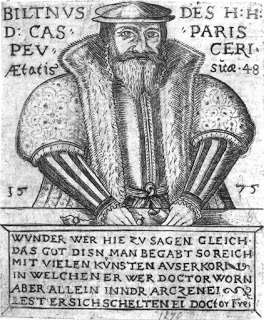
[Kaspar Peucer—public domain, wikimedia File:Kaspar_Peucer.jpg]
Caspar Peucer spent twelve years in prison (1574 – 1586) over his interpretation of the Lord’s Supper. Strict Lutherans believed in the real presence of Christ in the Eucharist. “The body and blood of Christ are truly present, and are communicated to those that eat in the Lord’s Supper.” After Luther’s death Philipp Melanchthon and his followers (Philippists) promoted a view more in line with that of the Swiss Reformation, “with bread and wine are truly exhibited the body and blood of Christ to those that eat in the Lord’s Supper.”
Peucer, son-in-law of Melanchthon, was one of the most learned men of sixteenth-century Germany, and one of his nation’s leading Protestants. He had appointed many Philippists to positions in Wittenberg with the knowledge of the elector of Saxony and apparently with his approval (the elector desired friendly relations with the Calvinists). However, when it became inconvenient for the elector to follow this moderate line, authorities arrested Peucer on charges of crypto-Calvinism (“secret” Calvinism). His letters and writings proved his Calvinist view of the Lord’s Supper. And so the scholar found himself in prison. In spite of cruel pressure to renounce his position, he stuck with his views. No longer able to teach mathematics, astronomy, and medicine, he turned his hand to poetry, and wrote a long poem about his birthplace in Upper Lusatia, then a region of Bohemia.
After his release, he became the personal physician of the Prince of Anhalt. Among his many publications was a treatise on types of devinations.
